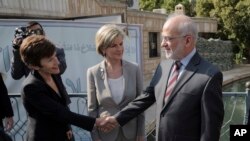Australia will soon send 200 special forces troops to Iraq to advise and assist Iraqi security forces in their fight against Islamic State militants. Australian warplanes are part of the U.S.-led coalition in the Middle East, and have already begun bombing raids on jihadist targets in Iraq
It has taken several weeks for officials to agree to a legal framework for the deployment of Australian Special Forces in Iraq.
Some 200 commandos have been stationed for the past month at a U.S. base in the United Arab Emirates waiting for an agreement to be finalized. They will act as advisers and help Iraqi forces fight Islamic State militants, who have seized a large swathe of territory across parts of Syria and Iraq.
Australian Super Hornet jet fighters have been flying almost daily combat missions against Islamic State targets in northern Iraq, but the deal between Canberra and Baghdad specifically precludes Australian troops from taking part in fighting on the ground.
Australian foreign minister Julie Bishop said elite Special Forces will help the Iraqis counter the threat posed by Sunni jihadists.
“I have finalized an agreement for a legal framework to enable our special forces to be deployed here, to advise and assist the Iraqi government in building up the capacity of the Iraqi security forces. Now, it will be a matter for our military to determine when our special forces will be deployed, so it will be an operational matter from now on,” said Bishop.
A recent poll suggested most Australians support Canberra’s decision to send troops and warplanes to stall the advance of Islamic State forces in Iraq. The survey also showed that Australians believe that military intervention will make their country less safe.
That is a view held by the Australian Greens leader, Christine Milne, who has insisted that Australia’s involvement in the conflict in Iraq will make Australia more of a target for extremism.
Last month, Australia received a direct threat from Islamic State militants in a propaganda video. It has urged Muslims to carry out attacks on civilians in a number of countries including Australia, Canada and France.
Australia recently increased its domestic terror threat level from medium to high because of fears of attacks by individuals radicalized by extremist ideology online, or by citizens returning from conflicts in the Middle East.




